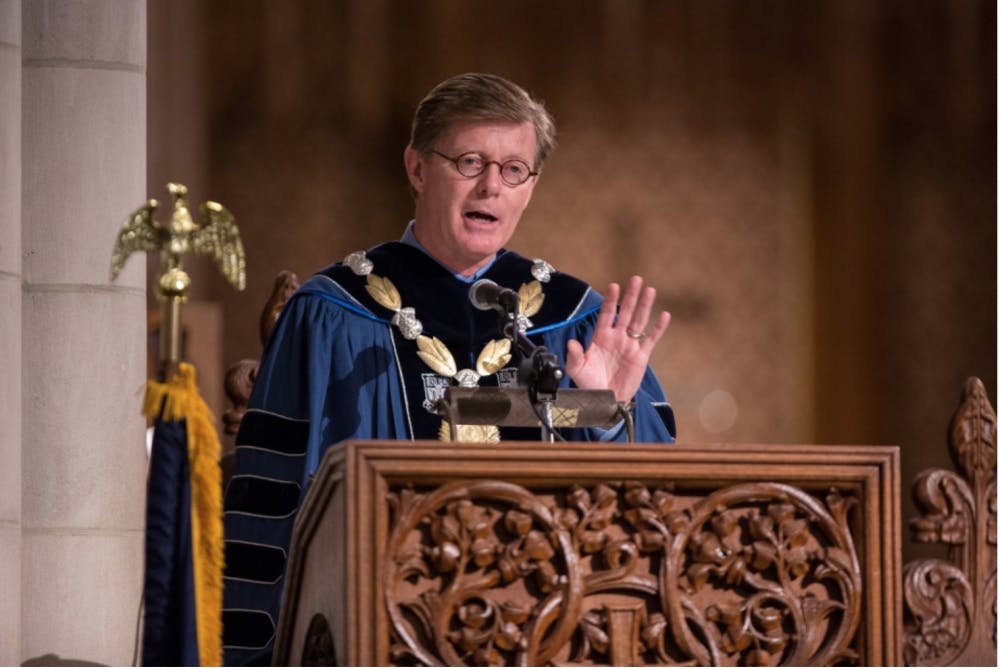Duke students frequently open their emails to see messages from President Vincent Price or other University officials.
This semester has seen statements by Price on such subjects as racist graffiti at the Mary Lou Williams Center, Hurricane Florence and on-campus voting. There is no established system for doing so, administration officials said—rather, the circumstances surrounding each statement are different.
“This is an art, not a science,” said Michael Schoenfeld, vice president for public affairs and government relations.
Schoenfeld explained that there are many people who want Price to make a statement on a topic at any given time, and the president must be “thoughtful and judicious” in deciding when to speak. He added that Price often consults with a variety of people—including senior leadership, student leaders, alumni and faculty—before deciding to speak, but that the final decision is ultimately Price's.
Price added that several criteria help him decide when to speak out. These include the importance of the matter to Duke and its values, the probability of the issue receiving significant media coverage and the number of people at Duke who will be affected.
Timing is also a consideration—there are certain moments, such as the beginning and end of a semester, the period before a break and the arrival of a storm like Florence, when members of the community may expect a statement.
However, Price said he sometimes decides that a statement is not the best way to reach the community.
“We do have other ways of reaching out, in combination with or in place of statements, including personal outreach,” he said.
Price isn't the only member of the administration who can make statements to the Duke community. Larry Moneta, vice president for student affairs, has sent emails on a variety of topics this year, ranging from weather conditions during hurricanes and snow storms to criminal incidents on campus.
Last month, L. Gregory Jones, dean of the Duke Divinity School, released a statement about the deportation of Samuel Oliver-Bruno, who had been living in a Durham church for nearly a year. These statements are coordinated among the administration to ensure that they represent Duke’s institutional values, Schoenfeld said.
Jones did not respond to a request for comment regarding his statement on Oliver-Bruno.
Once Price decides to speak out on an issue, the writing process can vary. Schoenfeld explained that Price sometimes drafts the statement himself—other times, another member of the administration drafts a statement, which Price would edit before its release. Schoenfeld emphasized that Price has the final say and places the final edits on any statement.
“Ultimately, it’s [Price’s] voice,” he said.
He added that a clearer timeline exists when the administration has advance warning of an event—such as the renaming of the Carr Building—as opposed to sudden and unplanned incidents. He also explained that there is no pre-written statement for any issue.
“There isn’t a file on the computer that says, ‘OK, swastika issue. We’ll pull out the pre-packaged message for that,’” Schoenfeld said.
Price must account for the views of those who will read a statement. Schoenfeld noted that a message sent to all students, faculty and staff will reach around 60,000 people, not counting those who will view it on social media. A message sent to alumni will reach another 180,000 individuals.
“I try to be brief,” Price said. “Brevity is, I think, important in reaching large audiences. But at the same time, brevity puts a lot of pressure on the single words you do choose.”
Price said that he shares messages with other members of the administration to get a sense of the ways in which they could be interpreted—or misinterpreted. He said that, as president, he must consider the fact that he speaks for Duke as an institution.
“The president speaks not only as an individual, but for the university,” Price said. “So care has to be taken to use that presidential voice wisely, and at times it can be a bit of a balancing act.”
Schoenfeld said that although crafting a statement can be difficult, it is also an opportunity.
“You have both the challenge and the opportunity to say something meaningful, say something powerful,” he said.
Get The Chronicle straight to your inbox
Signup for our weekly newsletter. Cancel at any time.
Matthew Griffin was editor-in-chief of The Chronicle's 116th volume.

